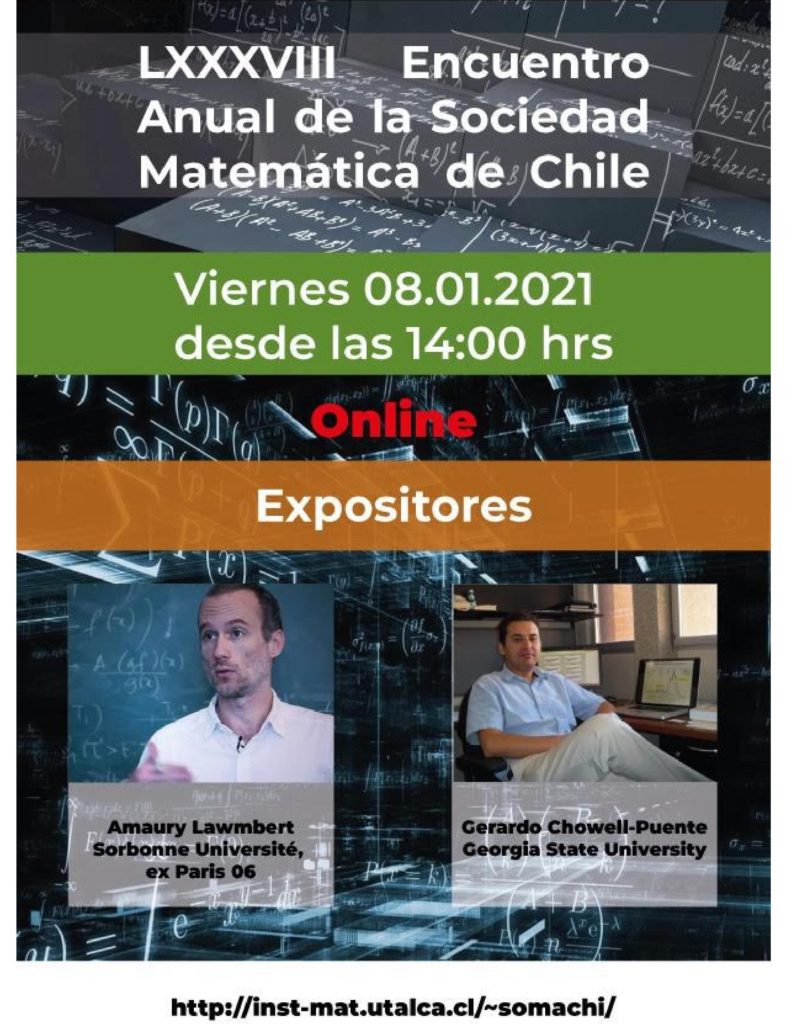Les informamos que el LXXXVIII Encuentro Anual de la Sociedad de Matemática de Chile se desarrollará de forma remota el 8 de enero de 2021.
Link: http://inst-mat.utalca.cl/~somachi/
Dada la contingencia actual, el programa del encuentro es reducido y está orientado a charlas en torno al tema COVID-19. El programa es:
14:00 Charla Amaury Lawmbert (Sorbonne Université, ex Paris 06)
15:30 Charla Gerardo Chowell-Puente (Georgia State University)
17:00 Asamblea SOMACHI
El evento será en una única sala zoom a la que se puede acceder con los datos siguientes:
https://reuna.zoom.us/j/82178722496?pwd=SVVXTEQ3UGdjWnQ4YjdWcDRjdHBUQT09
ID de reunión: 821 7872 2496
Código de acceso: 062087
Para consultas, favor de escribir a somachi@manquehue.net
Speaker: Amaury Lawmbert (Sorbonne Université, ex Paris 06)
Title: Two probabilistic models related to the SARS-Cov-2 epidemic
Abstract:
In this talk, we will discuss two studies performed by the speaker and his research team (SMILE, Collège de France/Sorbonne Université) in the beginning of the pandemic.
(1) We study a model where infected individuals can be symptomatic or asymptomatic, use a contact tracing mobile app or not. We investigate the effect of non-digital interventions (voluntary isolation upon symptom onset, quarantining private contacts) and of digital interventions (contact tracing thanks to the app), depending on the willingness to quarantine. We show that moderate rates of adoption of a contact tracing app can reduce R0 but are by no means sufficient to reduce it below 1 unless it is already very close to 1 thanks to non-digital interventions.
(2) We present a general and tractable framework for modeling and “nowcasting” the epidemic at a national scale. Our approach is based on a fairly general stochastic model for complex diseases using an arbitrarily large number of types (e.g., infective stage, clinical state, risk factor class). We show how structuring the infected population by its infection age, i.e., time elapsed since infection, allows us to decouple dependencies between stages and to time. In the large population limit (obtained either by assumption or as a spontaneous effect of the outbreak), the global scale of the epidemic is well captured by a deterministic McKendrick-Von Foerster 1-d PDE, and such an approximation allows us to make robust predictions on the fate of the epidemic.
Speaker: Gerardo Chowell-Puente (Georgia State University)
Title: The power of mathematical and statistical modeling tools to address the COVID-19 pandemic
Abstract:
The devastating COVID-19 pandemic represents an unprecedented opportunity to test and apply mathematical and statistical modeling approaches to infer key epidemiological and transmission characteristics of the novel coronavirus as well as evaluate the performance of different theoretical models for forecasting the trajectory of the pandemic at various spatial scales. In this context, I will present results from multiple ongoing collaborations involving interdisciplinary quantitative scientists, doctoral students, and public health officials.

